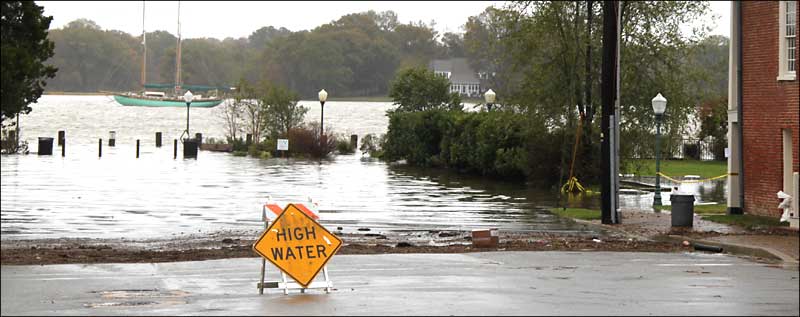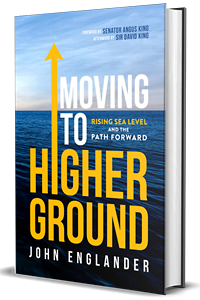Reduce or Adapt to Climate Change?
For decades, the ongoing debate in climate circles has been whether to reduce (the fancy word is mitigate) or adapt to climate change.
As warming increases we see our world changing in front of our eyes (storms, hurricanes, forest fires, floods), and the debate, just like the planet, has also heated up.
The argument against adaptation is that it means we are just giving up on this existential challenge without even tackling the fundamental problem. The argument for mitigation conveniently ignores the simple fact that it is highly unlikely to substantially slow the damage in the near-term, much less to fully reverse the damage.
I recently wrote about Bill Gates’ best-selling new book, “How to Avoid a Climate Disaster.” It’s a good book filled with plans and implied promises to get us to net zero emissions by 2060. Mostly, it’s rosy future planning based on future technology.
Some might say that’s vapor ware, a term for a product or service that is announced and promoted, but never built or delivered.
Gates recommends an all-out effort to stop CO2 and greenhouse gas emissions. I agree 100% that must be done, IF it can be done. We must attack the problem, globally, like we have never done before.
It will be extraordinarily difficult. Gates, governments, and companies large and small all agree we must stop greenhouse gas emissions in order to “solve” climate change. But little progress is made.
Besides sugar-coating the solution with vapor ware (don’t worry, all gone by 2040, 2050, or 2060 with non-existent technology), these leaders are really missing the major point.
Going to Net Zero, going to zero greenhouse gases, and even achieving it does not solve or stop climate change. It’s only a beginning of a solution, a very long term solution, and will do nothing to reverse the warming that has already occurred.
The planet is already too warm and is continuing to warm. The excess heat IS ALREADY STORED in our oceans, and will wreak havoc on us for centuries to come. It takes centuries for the oceans to fully adjust to new global atmospheric temperature, and we have no way to remove excess heat from the ocean. The oceans will only cool as the atmosphere cools over decades and centuries.
Excess heat in the ocean is already causing severe weather all around the globe that we are seeing in the headlines. It will continue. It will get worse the warmer the oceans get. Short term, the real threats from climate change will continue to be increasing episodes of severe weather of all forms.
However, far less visible, the excess heat already stored in our oceans will continue to melt the two giant ice sheets on Antarctica and Greenland at ever faster rates….
All of this profound climate change will continue even if we reduce the rate of greenhouse gas emissions to zero.
Once you understand the key differences between greenhouse gases, global warming, climate change, and the short term and permanent effects of excess ocean heat on our planet, and how long that heat will be here, it’s easier to see the path forward.
When you understand all the forces at work, it is clear that we must reduce the warming (mitigate), but accept that excess heat already here will force us to change. To move. Adaptation and response to severe weather, weather patterns, coastal erosion, and ultimately catastrophic sea level rise must be planned and executed. Adaptation becomes the highest priority.
We must aggressively pursue reduction of global warming, but with the informed understanding that it will not stop and reverse the effects of climate change for centuries, or longer.
My new book, Moving to Higher Ground, explores all of these topics within the framework of climate change. The book will help you connect the dots and clarify all of these climate issues. It will also help answer the question whether to reduce or adapt to climate change. Or do both. It goes on sale next week. Wish me luck, please.
Guest Article: Selling Books in A Pandemic
While overall book sales have been up in this past year, the trend is being driven by children’s books (bored kids at home) and popular fiction (bored parents stuck at home trying to teach bored children).
Bookstores have a fraction of their pre-Covid attendance. Book signings, once so popular, are temporarily extinct. John’s new book will be in bookstores, and we will do virtual signing events, but the bottom line is ONLINE is becoming a very important way to sell books in a pandemic.
The two most important weeks of a book’s life on Amazon are the week BEFORE and week AFTER the official date of publication (April 6, 1 week from today). The week before is vitally important for “pre-orders” as it tells Amazon there’s a lot of interest in the book. So Amazon promotes it more…
The week after is important because Amazon looks to the readers to see how they “judge” the book via reviews. They are impartial computer judges, but they do rate interviews from “verified purchasers” higher than an unsolicited (and often suspect) contributor.
So, if you’d really like to give John a hand with his new book (Hard Cover, Soft Cover, ebook, and audio book) give it a pre-order this week, and give it a fair review next week after it is auto-delivered to you.
Another great way to help out is to share information on social media. If you’d like to help out there, just send me a YES reply to:
billg@thesciencebookshelf.com.
I will send you some neat little graphics for FB, Twitter, and Linked IN – and it is completely up to you if you want to post them. One for this week, and another for next week. Then monthly for a couple of months. Just one graphic at a time, with suggestions of what to say in your post, in your words, not mine.
And that, my friends, is how you sell books online in a pandemic. And thank you. BG
PRE-ORDER WEEK, PRE-ORDER NOW!
A major new book with shocking insights
into the real effects and causes of global warming.
Find out why we can’t “solve” climate change, can’t stop severe
weather, and can’t stop sea level rise.
Find out why we must move to higher ground.
On-Sale Tuesday, April 6, 2021,
Pre-Order Today
NOW AVAILABLE FOR AMAZON PRE-ORDER (click here)
Hard Cover, Paperback, eBook, Audio Book


